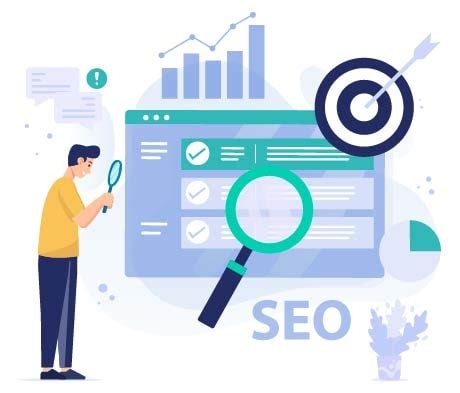In today's digital landscape, establishing a strong online presence has become pivotal for businesses looking to thrive in a highly competitive marketplace. One key avenue to achieving this is by ensuring that your website ranks high on search engine result pages (SERPs). By doing so, you can increase your visibility and reach, attracting more organic traffic and potential customers. However, in order to attain and maintain a prominent position in search rankings, it is essential to employ various strategies that enhance your website's search visibility.
One effective tactic is to focus on optimizing your website's content. While a visually appealing website is important, search engines primarily rely on the textual content to determine its relevance and rank. By employing strong and compelling language, you can not only captivate your visitors but also demonstrate to search engines that your website offers valuable and authoritative information in your industry.
An additional strategy to consider is link building. Search engines place great importance on the quality and quantity of inbound links to your website. By acquiring high-quality backlinks from reputable sources, you can significantly boost your website's credibility and authority, thus improving its search rankings. It is important to note, however, that the focus should be on obtaining relevant, high-authority links rather than simply amassing a large number of low-quality backlinks.
Enhance Your Website for Mobile Devices

In today's digital landscape, it is imperative for websites to adapt to the increasing usage of mobile devices. With a growing number of users accessing the internet through smartphones and tablets, optimizing your website for mobile devices has become a crucial strategy to improve user experience and boost your online presence.
Mobile optimization involves tailoring your website's design, functionality, and content to provide a seamless browsing experience for mobile users. It focuses on improving page load speed, ensuring responsive design, and optimizing content for smaller screens.
One essential aspect of mobile optimization is optimizing your website's loading speed. This involves minimizing the file size of your web pages, optimizing images, and utilizing browser caching techniques. By implementing these techniques, you can ensure that your website loads quickly on mobile devices, preventing users from leaving due to slow loading times.
Another crucial factor in mobile optimization is responsive design. Responsive design enables your website to adapt and adjust its layout dynamically based on the screen size of the device being used. It ensures that your website looks and functions flawlessly across a variety of devices, whether it's a smartphone, tablet, or desktop computer. This flexibility not only provides a better user experience but also helps improve your search engine rankings.
Optimizing your content for mobile devices is equally important. Mobile users often have a different intent and shorter attention spans compared to desktop users. Ensuring your content is concise and relevant, with easy-to-read fonts and clear headings, aids in providing a satisfying user experience. Additionally, optimizing your meta descriptions and title tags for mobile devices can help improve your website's visibility in search engine results pages.
| Key Points |
|---|
| 1. Optimize your website's loading speed by minimizing file sizes and optimizing images. |
| 2. Implement responsive design to ensure your website adapts to different screen sizes and devices. |
| 3. Create concise and relevant content with easy-to-read fonts and clear headings. |
| 4. Optimize meta descriptions and title tags specifically for mobile devices. |
By implementing these optimization techniques, your website will be better equipped to meet the demands and preferences of mobile users, ultimately improving your overall search engine rankings and driving organic traffic to your site.
Focus on High-Quality Content
When it comes to enhancing your website's visibility on search engines, one of the most crucial factors to consider is the quality of your content. Rather than relying solely on technical tactics, search engines now prioritize websites that offer valuable, relevant, and insightful content to their users.
To boost your website's search engine rankings, it is essential to focus on creating high-quality content that captivates and engages your target audience. By producing well-written articles, blog posts, guides, or informative resources, you can establish yourself as an authoritative figure in your industry and attract more organic traffic to your website.
Furthermore, by incorporating relevant keywords throughout your content but without overstuffing them, you can optimize your website for search engine algorithms while still providing valuable information to your readers. This ensures that your content remains informative and enjoyable to consume, rather than appearing as spammy or stuffed with keywords.
Another essential aspect of quality content creation is ensuring that your website is regularly updated with fresh and relevant information. Regularly publishing new content not only helps search engines recognize your website's relevance but also encourages users to return for more valuable insights and updates.
- Focus on creating in-depth and informative articles that answer common questions in your industry.
- Ensure your content is well-researched, accurate, and includes credible sources whenever possible.
- Avoid publishing duplicate content or content that can be found elsewhere on the web.
- Make use of headings, subheadings, bullet points, and numbered lists to break up your content and make it easier to skim.
- Include visually appealing images or infographics to enhance the overall user experience.
In summary, by prioritizing high-quality content creation, you can not only improve your website's search engine rankings but also establish yourself as a trusted source of information in your industry. Remember, quality content is key to attracting and retaining the attention of both search engines and your target audience.
Enhance Visibility with Relevant Keywords

To ensure your website ranks higher in search engine results, it is essential to optimize your content with keywords that are closely related to the topic or theme of your website. By strategically incorporating relevant keywords throughout your website, you can improve its visibility and attract more organic traffic.
Keywords play a crucial role in search engine optimization (SEO), as they serve as the bridge between what people search for and the content you provide. By using appropriate and well-researched keywords, you can increase the chances of your website appearing in relevant search queries.
Choosing the Right Keywords:
When selecting keywords, it is crucial to consider the intent of your target audience. Think about what words or phrases they are likely to use when searching for information related to your website. Conducting thorough keyword research can help you identify the most relevant and valuable keywords for your content.
For example, if you have a website selling organic beauty products, relevant keywords may include "natural skincare products," "organic cosmetics," or "chemical-free beauty products."
Strategic Keyword Placement:
Once you have identified the relevant keywords, it is essential to strategically place them throughout your website's content. This includes incorporating keywords in page titles, headings, meta tags, image alt tags, and within the body of your content.
However, it is crucial to maintain a balance and avoid keyword stuffing, which can negatively impact your website's rankings. Ensure that the keywords are incorporated naturally and seamlessly into your content.
Creating High-Quality Content:
While utilizing relevant keywords is important, it is equally essential to create high-quality, informative, and engaging content for your website. Search engines not only consider keywords but also evaluate the overall quality and relevance of the content when determining search rankings.
By focusing on providing valuable and relevant information to your audience, you can establish your website as a reliable source and improve its rankings in search engine results.
Regular Keyword Analysis and Updates:
SEO is an ongoing process, and it is important to regularly analyze and update your keyword strategy. As search trends and user behavior change, so should your choice of keywords. Stay updated with industry trends and adapt your content and keywords accordingly to maintain your website's visibility in search engine rankings.
By consistently optimizing your website with relevant keywords, you can enhance its visibility, attract targeted organic traffic, and improve your overall search engine rankings.
Enhance Website Loading Speed
Discover strategies to optimize your website's loading speed in order to enhance user experience and improve on-page SEO performance. An efficient loading speed is crucial for attracting and retaining visitors, optimizing conversions, and ultimately boosting your website's search visibility.
1. Streamline Code
Optimize your website's code by removing unnecessary elements, reducing server requests, and compressing files to enhance loading speed. Clean and efficient code improves website performance and ensures a smoother user experience.
2. Optimize Images
Compress and properly format images to reduce file size without compromising on visual quality. Large image files contribute to slower loading times, so optimizing images is key to improving website speed and reducing bounce rates.
3. Leverage Caching
Implement browser caching to store frequently accessed website elements on visitors' devices. This reduces the need for repetitive downloads, resulting in faster loading times for returning visitors.
4. Minify CSS and JavaScript
Remove unnecessary spaces, line breaks, and comments from CSS and JavaScript files to reduce file size. Minifying these files improves loading speed and overall website performance.
5. Opt for a Content Delivery Network (CDN)
Utilize a CDN to store and deliver your website's content from servers located closer to your target audience. By reducing the data's physical distance traveled, a CDN enhances loading speed and improves user experience.
6. Prioritize Above-the-Fold Content
Load essential content above the fold first to provide users with a quick initial impression of your website. This focuses on key information while the remaining content continues to load, preventing users from leaving due to long loading times.
7. Optimize Server Response Time
Ensure that your web hosting provider offers fast server response times. Slow server responses can significantly impact loading speed, so opting for a reliable hosting service is crucial.
8. Enable Gzip Compression
Enable Gzip compression to reduce file sizes during transmission. Compressed files are quicker to load, resulting in faster website speeds and improved user experience.
By implementing these strategies to improve your website's loading speed, you can provide users with a seamless browsing experience, increase engagement, and enhance your search engine rankings.
Improving User Experience for Better Online Performance

In the realm of website optimization, enhancing user experience plays a vital role in achieving desirable online results. Prioritizing user satisfaction and engagement can significantly impact the overall performance of a website. By focusing on providing seamless navigation, relevant and engaging content, and responsive design, website owners can create an enjoyable browsing experience that promotes increased visitor engagement and improved online visibility.
One crucial aspect of enhancing user experience is ensuring easy and intuitive navigation throughout the website. Users should be able to effortlessly find the information they are looking for, with clear and logical website structure. Implementing intuitive menus, search functionality, and breadcrumbs can assist users in easily navigating the website, reducing bounce rates and encouraging longer browsing sessions.
Another key element in improving user experience is the delivery of relevant and engaging content. High-quality and informative content not only keeps visitors engaged but also helps establish authority and credibility. Regularly updating content, using visually appealing multimedia elements, and incorporating interactive features are excellent techniques to captivate users and encourage them to stay on the website longer.
Responsive design is another crucial factor in enhancing user experience. With the increasing use of mobile devices, websites must adapt to different screen sizes and orientations. Ensuring that a website is mobile-friendly and responsive allows users to easily access and navigate the content, regardless of the device they are using. This can enhance user satisfaction, increase time spent on the website, and ultimately contribute to better search engine rankings.
Establish Strong Connections: Build High-Quality Backlinks
In the digital landscape, forging robust connections is paramount for elevating your website's visibility. By investing in high-quality backlinks, you can effectively establish an intricate network of interconnections, propelling your site towards the upper echelons of search engine rankings. Backlinks, also referred to as inbound or incoming links, act as a vote of confidence from other authoritative websites, indicating that your content possesses utility, credibility, and value. Integrating a diverse range of backlink sources and employing strategic link-building tactics can significantly enhance your website's online presence and visibility.
- Harvest the Power of Guest Blogging
- Embrace the Influencer Outreach Approach
- Cultivate Relationships with Industry Experts
- Seek Out Niche Directories
- Collaborate through Partnerships
By incorporating these proven methods into your link-building strategy, you can construct a powerful web of high-quality backlinks that bolsters your website's authority and strengthens its position in search engine rankings. Remember, the key lies not only in acquiring backlinks but also in actively nurturing and maintaining these connections to secure long-term success.
Maximize the Potential of Social Media Marketing

One powerful strategy to enhance your online presence and boost your visibility in search engine results is through the effective utilization of social media marketing. By harnessing the immense power of social platforms, you can engage with your target audience, build brand awareness, and attract quality traffic to your website.
Enhance Meta Tags for Improved Online Visibility
Discover the secrets to optimizing meta tags and unlocking greater visibility for your website in search engine results. By strategically crafting and implementing these tags, you can effectively enhance your online presence and attract more organic traffic.
1. Curate Compelling Title Tags
Title tags play a crucial role in conveying the relevance and value of your web pages to search engines. By crafting concise, keyword-rich, and compelling titles, you can significantly improve your website's click-through rates and attract a larger audience.
2. Craft Descriptive Meta Descriptions
Meta descriptions provide a brief overview of your web page's content and serve as a hook to entice users to click on your link in search results. By creating unique and compelling meta descriptions that accurately reflect your page's content, you can optimize click-through rates and improve search engine rankings.
3. Utilize Relevant Meta Keywords
While meta keywords no longer hold the same weight in search engine algorithms, incorporating relevant and targeted keywords can still contribute to your SEO efforts. By selecting and using appropriate keywords that align with your content, you can signal relevance to search engines and increase your chances of ranking higher.
4. Optimize Alt Tags for Images
Alt tags or alternative text are essential for both user experience and search engine optimization. By accurately describing the content of images using relevant keywords, you can improve your website's accessibility, enhance its overall SEO performance, and attract more organic traffic through image search results.
5. Implement Structured Data Markup
Structured data markup, such as schema.org, helps search engines understand the context and meaning of your web content. By implementing structured data markup on your website, you can enhance search engine comprehension, which may lead to rich snippets in search results and increased click-through rates.
Optimizing meta tags is a powerful strategy to boost your website's visibility in search engine results. By giving careful attention to title tags, meta descriptions, meta keywords, alt tags for images, and structured data markup, you can improve your website's relevancy, attract more organic traffic, and ultimately achieve higher search engine rankings.
Track and Evaluate Website Performance

In order to achieve optimal visibility and effectiveness in the vast online landscape, it is essential to continuously monitor and analyze the performance of your website. By closely observing key metrics and indicators, you can gain invaluable insights into the strengths and weaknesses of your online presence, allowing you to make informed decisions and take strategic actions to improve your website's performance.
Regular monitoring and analysis of website performance enable you to assess its overall health, identify areas for improvement, and make data-driven adjustments to enhance its visibility, user experience, and conversion rates. By tracking relevant performance indicators such as website traffic, engagement metrics, loading speed, and search engine rankings, you can determine the effectiveness of your current strategies and identify any potential obstacles that may be hindering your website's performance.
An integral part of monitoring and analyzing website performance involves setting up and utilizing appropriate tools and technologies. These enable you to gather and interpret relevant data, generate reports, and benchmark your website's performance against industry standards and competitors. Leveraging advanced analytics platforms and SEO tools, you can gain deep insights into user behavior, source of traffic, popular pages, and conversion funnels, enabling you to optimize your website for better performance and engagement.
By continuously monitoring and analyzing your website's performance, you can stay ahead of emerging trends, anticipate changes in user behavior, and adapt your strategies accordingly. Regular performance evaluation empowers you to identify gaps and opportunities in your current optimizations, revise your keyword targeting strategies, enhance your website's mobile compatibility, and improve overall user experience. In the ever-evolving world of digital marketing, staying proactive and responsive to fluctuations in website performance is essential for maintaining visibility and competitive advantage.
FAQ
What are some effective tactics to boost website search engine rankings?
There are several tactics that can help boost website search engine rankings. Some of the most effective ones include optimizing website content with relevant keywords, creating high-quality and unique content, building backlinks from reputable websites, improving website loading speed, and ensuring mobile-friendliness.
Is it important to optimize website content with relevant keywords?
Yes, optimizing website content with relevant keywords is crucial for improving search engine rankings. By including keywords that are commonly used by users when searching for relevant information, search engines can better understand the content of the website and rank it higher in search results.
How does creating high-quality and unique content help to boost search engine rankings?
Creatin high-quality and unique content is important for search engine rankings because it attracts more visitors and encourages them to stay on the website longer. Search engines consider user engagement as a ranking factor, so if a website has valuable and original content, it is likely to rank higher in search results.
Why are backlinks important for improving search engine rankings?
Backlinks, or incoming links from other websites, are important for improving search engine rankings because they act as a vote of confidence for a website's credibility and authority. When reputable websites link to a website, search engines perceive it as a signal that the linked website is reliable and valuable, resulting in higher search engine rankings.
How does website loading speed impact search engine rankings?
Website loading speed is a crucial factor in search engine rankings because search engines aim to provide the best user experience. If a website takes too long to load, users are more likely to bounce back and visit other websites. Therefore, search engines tend to favor websites that load quickly and penalize those with slow loading speed.



